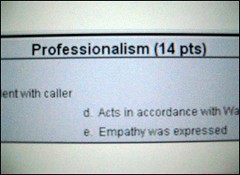There are more than enough examples out there of public relations campaigns with questionable ethics,
outright criminal behavior, engaging in activities that harm the client, clueless practices that show a lack of ability to think through a process and deceptive practices like Astroturfing to push through an agenda at any cost.
And you need only head over to the Bad Pitch blog to read about some of the more tactical nightmares out there. Let’s face it, PR has a PR problem.
I think that all public relations professionals should consider getting accredited in public relations (APR) or the Accredited Business Communicator (ABC) designation.
I took my APR exam in late 1999, and was accredited in 2000, as soon as I qualified to take it. I can tell you that studying for the APR was the single-most important element in my success as a public relations practitioner. It gave me a way of thinking about PR problems that I didn’t have.
This year, I am serving as the Accreditation Chair for PRSA San Antonio, and I am working with two candidates that are about to take their readiness review. I have seen them blossom as they have been getting ready for this exam.
So, I strongly disagree with the naysayers out there that say the APR, ABC and other similar designations are meaningless (see comments of post), self-promotional and not useful unless they are a requirement of employment. I know Gary Goldhammer was somewhat kidding in his comment, but the sentiment is out there
Going through the accredittion process makes for better professionals. Listening to a new PRSA podcast series yesterday about the value of accreditation, I stated to make my own list of why accreditation is valuable:
Ethical Practice of Public Relations. Part of exam is demonstrating that you know how to apply a set of ethical standards to the practice of public relations. Both PRSA and IABC maintain a code of ethics. Those that carry the APR designation don’t have ignorance as an excuse for unethical behavior.
PR as a Management Function. Public relations is at its best when serving in a management function. Knowing how to speak the language of the CEO and having the confidence to push back on decisions that would be otherwise disastrous in the public sphere are some of the main benefits of PR counsel. The process of studying for the APR instills this confidence in candidates. I have seen it happen time and time again.
PR Programs that Link to Organizational Goals. This is one of the most foundational of all of the benefits, gaining the knowledge that public relations programs follow a process and being able to easily show the value that PR adds to the organization. And based on the 2005 PR Week/Korn Ferry Salary Survey, accredited public relations professionals earn 20 percent more than those that are not accredited. Some of that may be because of overall experience, but I think some of that is from the experience gained after earning the designation.
Through Josh Hallet’s blog, I found a great quote by Bob O’Malley, former president of the Orlando chapter of the Florida Public Relations Associations, on a blog he kept as he studied for and passed the APR exam, “I am a much better professional than I was before I began the process,” he said.
And that is exactly my point. Public relations needs to be professionalized. While we probably will never be required to get a credential, the process of getting the credential is priceless. While it may not directly get you a job, the things you learn while studying for it will.
Also read Keith Pillow’s take on how you will benefit from accreditation in PR at the Forward blog.
